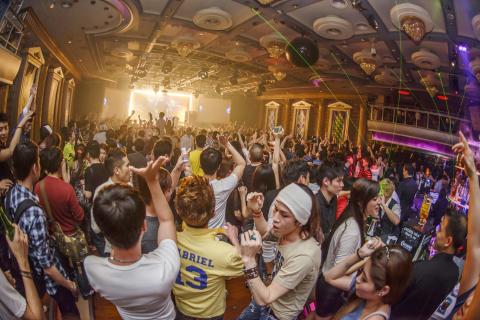All good things come to an end, and this is true for Luxy. The club announced on its Facebook page this week that it’s closing its doors.
While the club didn’t say why it’s closing, it’s no secret that clubs all over Taipei have recently been under intense scrutiny by authorities, and that can’t be good for business.
Over the last 12 years, the iconic club has helped turn Taipei into the clubbing Mecca that it is today, earning it a reputation within the international DJ and dance music community. Luxy was the first club in Taipei to import international DJs, and has since hosted artists from several different genres: Armin Van Buuren, Steve Aoki, Tiesto, Paul Van Dyk, and Ferry Corsten have all played there, as have Snoop Dogg, Dr. Dre, LMFAO — and the list goes on.

Photo courtesy of Lorenzo
Jon Jenkins, one of the co-founders of Boom Events, worked almost exclusively with Luxy because he felt a strong sense of family culture there.
“Luxy has become a legend,” he said. “It is a classic international spot, where partygoers of a wide age range have been making memories ... We are constantly meeting people around Asia, and even people who haven’t partied for years, that have stories about the crazy memories they have inside Luxy.”
Luxy, a portmanteau of luxury and sexy, pushed boundaries, took risks and defied expectations, and it was the first club in Taipei to do this. Through its music, its concepts and its performances by Luxy Girls and Luxy Boys, it transitioned the city from one five years behind the music industry, to one that competes with the world’s top clubs. It paved the way for similar clubs to open and created a city rich with options and diversity in music culture. And while those clubs came and went, none ever came close to challenging Luxy’s legendary status.
“Luxy reinvented Taiwan’s standard for nightlife entertainment. It took a regular night out on the town and provided partygoers with an escape to something that exceeded global expectations,” said Royal Chiou, who has been throwing parties at Luxy for 11 years.
Dominik Tyliszczak, who has been deejaying at the club since its inception, still remembers his big opener for Plump DJs.
“It was my first time opening for a top 100 DJ and it was a massive night. There were people up to the rafters and it was a bit different musically than I am normally used to playing. I was so nervous that I couldn’t stop shaking. I kept freaking out until I had a good puke back stage. Then it was amazing,” he said.
And with that, it is with heavy hearts that we bid farewell to Luxy.
“It wasn’t a fad of nightlife in Taipei... Luxy was a landmark. It’s an icon.” Jenkins said.
■ Luxy’s final week begins Wednesday with Vega’s last hurrah, 5F, 201, Zhongxiao E Rd Sec 4, Taipei City (台北市忠孝東路四段201號5樓). Admission: free for ladies, NT$600 with two drinks for gents. The final weekend is March 20 and 21 from 10:30pm to 4:30am and cover is NT$700 and includes two drinks.

May 11 to May 18 The original Taichung Railway Station was long thought to have been completely razed. Opening on May 15, 1905, the one-story wooden structure soon outgrew its purpose and was replaced in 1917 by a grandiose, Western-style station. During construction on the third-generation station in 2017, workers discovered the service pit for the original station’s locomotive depot. A year later, a small wooden building on site was determined by historians to be the first stationmaster’s office, built around 1908. With these findings, the Taichung Railway Station Cultural Park now boasts that it has

Wooden houses wedged between concrete, crumbling brick facades with roofs gaping to the sky, and tiled art deco buildings down narrow alleyways: Taichung Central District’s (中區) aging architecture reveals both the allure and reality of the old downtown. From Indigenous settlement to capital under Qing Dynasty rule through to Japanese colonization, Taichung’s Central District holds a long and layered history. The bygone beauty of its streets once earned it the nickname “Little Kyoto.” Since the late eighties, however, the shifting of economic and government centers westward signaled a gradual decline in the area’s evolving fortunes. With the regeneration of the once

In February of this year the Taipei Times reported on the visit of Lienchiang County Commissioner Wang Chung-ming (王忠銘) of the Chinese Nationalist Party (KMT) and a delegation to a lantern festival in Fuzhou’s Mawei District in Fujian Province. “Today, Mawei and Matsu jointly marked the lantern festival,” Wang was quoted as saying, adding that both sides “being of one people,” is a cause for joy. Wang was passing around a common claim of officials of the People’s Republic of China (PRC) and the PRC’s allies and supporters in Taiwan — KMT and the Taiwan People’s Party — and elsewhere: Taiwan and

Even by the standards of Ukraine’s International Legion, which comprises volunteers from over 55 countries, Han has an unusual backstory. Born in Taichung, he grew up in Costa Rica — then one of Taiwan’s diplomatic allies — where a relative worked for the embassy. After attending an American international high school in San Jose, Costa Rica’s capital, Han — who prefers to use only his given name for OPSEC (operations security) reasons — moved to the US in his teens. He attended Penn State University before returning to Taiwan to work in the semiconductor industry in Kaohsiung, where he